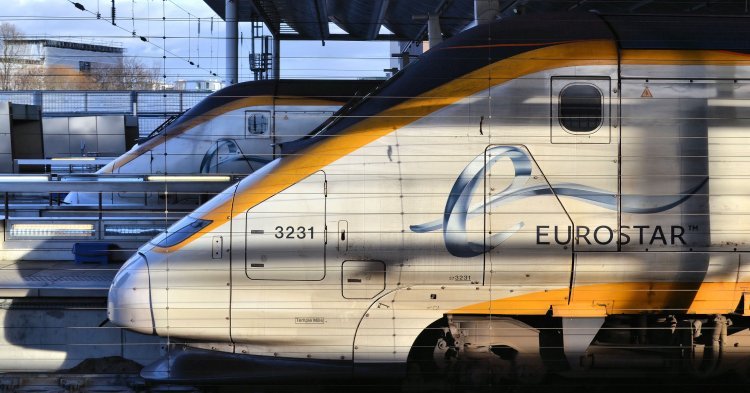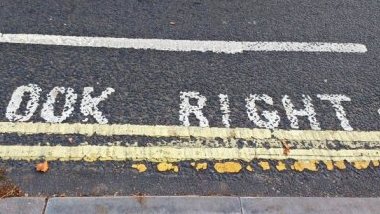I’ve spent the last two years of my life in France, and my home country has become foreign.
Rooted to the spot in the middle of London St. Pancras Railway Station, a whirlwind of sound and bright lights and activity trapped in a vast and sterile building, I feel totally invisible. A drop in a cascade of thousands of human beings. Everyone is in a rush; no one spares me a glance.
With me; I have nothing but my life packed into three bags, my treasured touring bike, and a great feeling of uncertainty. Finding a path through the waves of people churning their way ruthlessly through the ever-flooding crowds is going to be tricky, and possibly detrimental to my health.
Wheeled suitcases frantically follow the many pairs of designer shoes clipping the slick, shiny floor in hazardous zigzags. If everyone were holding the end of the cord instead, they would weave a gigantic canvas in thirty seconds flat. What with the station announcements for platforms, the jolting ebbs and soundbites of other people’s conversations and the urgent telephone calls, the wall of noise is overwhelming. Hearing English on all sides is extremely strange.
Two people run into my front wheel with their suitcases in their rush for their trains, choosing not to notice that I exist. Aren’t the British supposed to be polite?
I have an hour before the train that which wills me towards the West Midlands, the region where I’m originally from, and in the meantime, I’m hungry. It takes me ten minutes to stagger my bike and the bulky bags to a snack stand too exposed to the rush and with too little choice. I realise that I don’t have any English money, apart from a £5 note of questionable hygiene that has been crumpled since God-knows-when in an abandoned corner of my purse. When I try to buy a sandwich (the most basic on display as five pounds doesn’t get you far in London), the guy behind the counter looks at me as if I were trying to pay him in yen. “We don’t take these anymore”, he says.
I don’t understand. Has Britain adopted the euro after all? “The new fivers have been around for months, you need to get the old ones changed at the bank”. His friendly manner and light-hearted East London accent don’t quite hide the restraint of superciliousness in his tone and gently-taking-the-mickey grin. “Where have you been all this time?”
For the last two years, Strasbourg; a medium-sized and quintessentially European city buried so deep into eastern France that the tram running over the border into Germany is part of the transport network. A bit before that, for a year, Lyon was the place I called home; before that, three months in Montpellier; before that, a handful of other stays all over France.
I’ve travelled more in France than I have in the UK, and apart from holidays elsewhere and biannual pilgrimages to visit my family (once at Christmas, once in the summer), all of my recent memories are within the borders of the country the French call the “Hexagon”. I lived through monumental events for the country that made headlines worldwide; Emmanuel Macron’s victory over Marine Le Pen (which I celebrated, because there’s not much in that line of enquiry to celebrate in the UK), the blockades of the universities by students armed with an enterprising number of wheelie bins, the nationwide strikes by the country’s only railway operator SNCF, France’s victory in the World Cup (which I celebrated, because there’s not much in that line of enquiry to celebrate in the UK). France is home to such an extent that I even miss the mildly annoying jingle of the SNCF. In England, in stark contrast, I no longer even know what people talk about… apart from maybe one thing. But I’ll come back to that.
“By card, then”, I say, and hand over my English card, realising two seconds later that I’ve forgotten the PIN. Thank God for…um…paiement sans contact…the life-saving technology for which I don’t have a word in English because it barely existed when I left. “Without contact?” I attempt, and the eyebrows of the Cockney vendor jump up another notch, taking some of his patience along with them. “Do you mean contactless?” I’m pretty sure he thinks I’m the one taking the mickey.
And I understand for the first time that there is going to be this gap between what people see and what I feel. I grew up here, people tell me I look English, I have a pretty neutral (and rather boring) English accent. But I’ve spent enough time in France to feel… what? Still English, but not exactly. French? Not really, because in France I’m still a foreigner. European? Certainly. But can you be English and European?
I can learn to buy sandwiches again without making a fool out of myself, but my time abroad has come to constitute a huge part of my identity, and I now see my own country through a new lens. At the same time, events during these two years and a handful of months have turned British society upside down and shaken it to its very core. Arriving back here might have thrown me into an identity crisis, but Britain is in the midst of its own.
“Brexit is omnipresent in people’s thoughts; it has carved out a place in their mentalities and is constantly reinforced by shouted reminders from the media.”
In the course of the week, I begin to understand that Brexit is now a part of everyday life. It’s the first topic when you turn the TV on for the evening news. It accounts for a good 50% of headlines in the newspapers. An entire category is allocated to Brexit jokes in comedy shows. With friends and family, it can go two ways; ceaseless discussion or prudent taboo. The neighbour who I haven’t seen in over a year brings it up within a few minutes. In the pub, the couple at the table next to the one where I’m sharing a meal with my parents are talking about it. Knowing that I’m interested in politics, my uncle asks for my opinion several times during the same evening.
Brexit is omnipresent in people’s thoughts; it has carved out a place in their mentalities and is constantly reinforced by shouted reminders from the media. In the face of this obsession, it is difficult to imagine Britain today without Brexit. The two have been irreversibly intertwined; the decision to leave the EU has fundamentally altered the country’s path through history and irrevocably changed how we see ourselves and what it means to be British.
Cancelling Brexit tomorrow would not suffice to go back to the UK as it was before, because the rise of racist hate crime in the wake of the referendum, the loss of trust in our political system, or the divisions exposed or even created between regions, classes and, even worse, within families, could not so easily be erased.
We have asked ourselves too many questions to which there are no easy answers, and our reverse gear is permanently out of order. Can we claim to be an open and tolerant nation, as I had (perhaps naively) assumed before? If so, why are we so readily closing the symbolic door on international cooperation? Has our national pride, which used to appear harmless and even charming, become a superiority complex? Because it’s us, after all, who hosted the first industrial revolution, who colonised a quarter of the world, who live on an island... Is the “Leave” vote an attempt to protect a desperate, wholly unattractive and fundamentally British need to feel powerful and unique?
In which case, isn’t it then more a feeling of insecurity? Because if this is a call to return to fond memories of past, whenever that may be, it’s also a refusal to recognise that the world has changed; a rejection of a world order of which we are no longer in front. Is our feeling of national belonging really so fragile, based on arrogance and painfully misplaced pride?
As I start a new life for myself on this peculiar island, I hope to continue reflecting on these questions and many others, even if, in part, I fear the answers.
I’ve changed, and this country has changed without me. I found my flat in Strasbourg the day before the referendum, and since then, I have clung to an impression that being far away will spare me from all of this. Returning to the UK for my Master’s means facing the trauma that has been stabbing away, on and off, since that shock-ridden heart-stopping day in June 2016, and giving up the pretence.
And it hurts.
It’s a (difficult) return home.








Follow the comments: |
|
